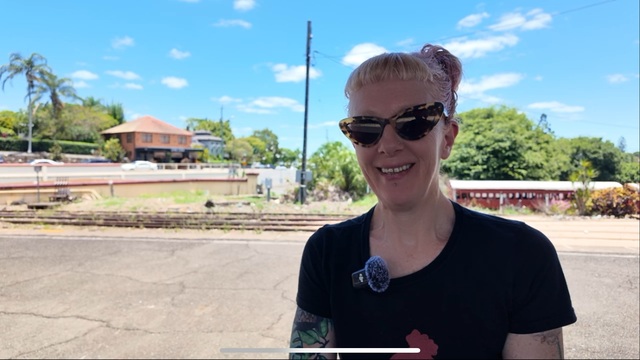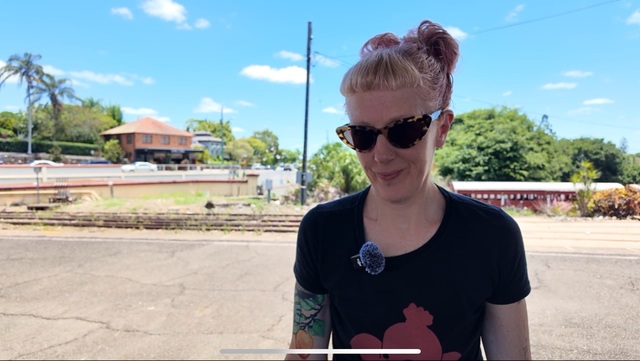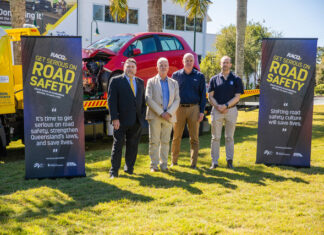Is it time or place that has shows the biggest changes in the LGBTQIA+ community?
Having lived as a Queer person not only across Australia but internationally, Gympie local Lauren Granger-Brown has noticed the landscape of the Queer identity change with ups and downs of venues and safe spaces, public attitudes, the acts of violence against Queer people and the differences between herself and the youth of today.
Lauren Granger-Brown is a cisgender and Queer woman originally from Melbourne where she worked as an English language teacher and teacher trainer where she taught international students overseas and in Australia but has since been undertaking ongoing and short-term contract gigs since coming to Gympie.
For Lauren, she believes the biggest thing that separates the Queer identity between Melbourne and Gympie would be time rather than Geography.
“Alot had changed over that time,“ she said.
“Being in Gympie the last decade, it’s a different place, it’s a regional place and Melbourne is a big city.“
Further explaining that during her time in Melbourne, the gay scene was huge with gay bars, clubs, precincts and even gay press that could be picked up at these spaces littered across the city.
But it was also during this time that those in the LGBTQIA+ community were experiencing a more common fear of being bashed, facing abuse as well as the threat of sexual harassment and violence.
“I know there were lots of so called gay bashings at that time, it was typical I suppose,“ she said.
“Within those communities there was fear around it but there was also alot of pride and strength.
“And maybe because the community wasn’t so integrated I suppose and legally not so accepted, socially in my time, reasonably accepted, but legally not really.
“That community, those spaces were really really important you knew they were safe spaces, you knew you could meet people, whether its for finding love, finding sex, just hanging out with people just having fun, all of it, those spaces were crucial.
“Those spaces were screaming we’re here we’re queer, they were a real beacon for people who needed them.“
However, in her experience Lauren has also seen the downfall of these spaces believing that for the most part, these important spaces have disappeared and that further this isn’t exclusive to the regional experience but rather a global issue.
One of the factors Lauren believes attributes to this is social media and hook-up apps which means that people don’t make as much use of these spaces as they used to as people are able to stay home and be connected with each other or find sex and relationships through these apps.
Continuing off this, the experience of young people is significantly different to her own, explaining that during secondary school it would have been unusual for someone to come out as Queer.
“The time I’ve been in Gympie has been a time where young people I think feel freer to identify themselves as who they feel they are and there’s much less stigma around,“ she said.
During her time in Gympie, Lauren also spent time working on Pride projects and events with the Gympie Pride Committee where the goal of the group was told hold some of the largest Queer events in all of Queensland.
The desire for this came from the story of the ChillOut festival in Daylesford in Victoria which is hosted annually as a massive Queer event.
Prior to the popularity of the festival, Daylesford was a little spa town where people went to take the waters until the small festival grew into the massive festival it is today.
Lauren explained that what apparently happened in Daylesford was that at first the conservative townsfolk rejected it.
“They were afraid, they didn’t know, they were fearful for their own identities, their own ways of life, they didnt know what it would mean because they were ignorant to these people,“ he said.
“But soon the business case became clear to them,“
This then assisted in leading to the acceptance of the festival due to the economic benefit of people coming to spend money at their pubs, shops and town in general.
“Since that started happening lots of gay people have moved there and the demographic has totally changed,“ she said.
“Regional towns are much more homogenous, in rural Australia they tend to be very white and very same-same apart from towns that have a very visible indigenous population.“
’In Gympie I’ve noticed more and more people feel uncomfortable being out, certainly the culture is changing from my observation.“
And from this inspiring story of ChillOut, Lauren was ambitious to see Gympie follow in similar footsteps.
“I was pushing hard for that to happen, that was really my ambition,“ she said.
“I think having events and festivals that celebrate and foreground trans and gay and Queer people, I think they go a long way to increasing visibility, acceptance.
“This is what I was partly thinking of when I was involved with the Gympie Pride Group and bringing more tourism and money to the town.“
By hosting cultural events and bringing in diversity to the town, Lauren believes that acceptance, visibility and growth would be the biproducts that affect Gympie for the better of not only the LGBTQIA+ community but for everyone.









